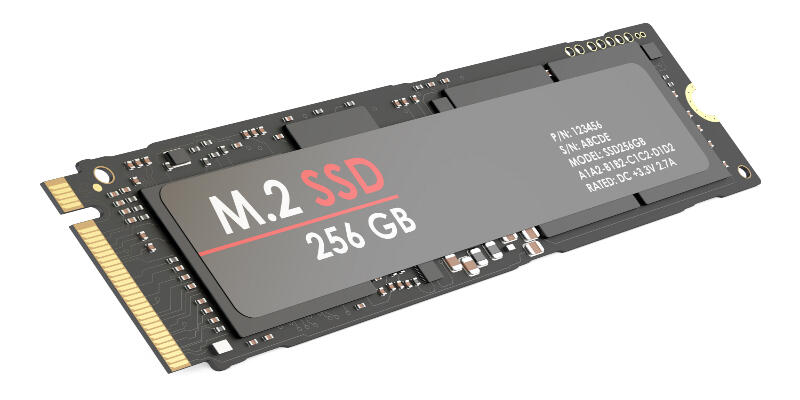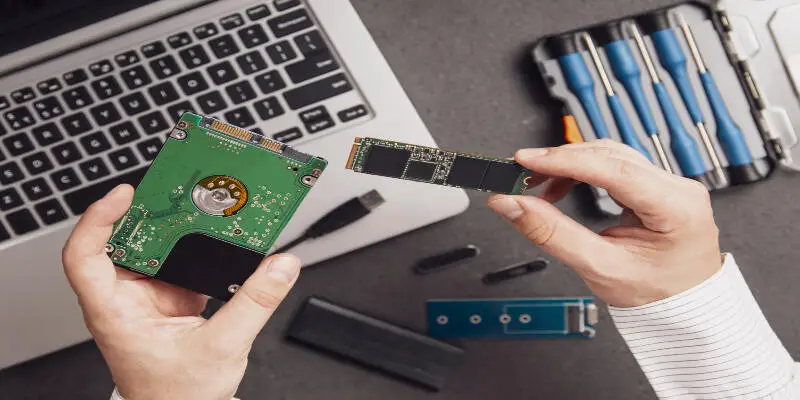Disclaimer: This post may contain affiliate links, meaning we get a small commission if you make a purchase through our links, at no cost to you. For more information, please visit our Disclaimer Page.
Solid State Drives (SSD) have become an increasingly popular option for upgrading a computer’s hard drive.
An SSD has tons of advantages. It is durable, doesn’t produce noise, has a low power consumption rate, and faster than a hard drive. It also deletes data permanently and this is a source of security to your data.

Table of Contents
Is an SSD Good for a Laptop?
An SSD is certainly good for a laptop, and If your machine has it, then everything will be prompt. There has been a shift from the traditional hard disk drives to Solid State drives in the laptop market. And there are many reasons for it.
The SSDs are very responsive and thus they make operations like saving and loading files/programs instant. All the launched applications and clicked icons will always be right in front of you within no time compared to if you used an HDD.
A laptop’s resumption from sleep mode, booting, game levels, and the images will load extra fast.
Moreover, SSDs consume little power and are not likely to stop working. They also take up limited storage space. This implies you cannot ignore the advantages these drives offer a laptop.
This is regarding the performance of an operating system and everything on it. As you think about a laptop with this drive and with a consideration of all factors, it’s indeed what you can prioritize nowadays.
And even if you glance at the market’s actual budget, it will remain a domain of affordable HDDs and eMMC.
Is an SSD Better Than Hard Drive?
Whether an SSD is better than a hard drive or not, depends on the qualities you are looking for In a drive.
Apart from cost and storage, if your focus is on speed, reliability, and power, then an SSD is more worth it than an HDD. Here are the factors to consider when choosing a drive;
Capacity
If you are looking for more storage space then a hard drive wins. SSDs do come in small storage sizes. The capacity for an HDD can go up to twelve terabytes for commercial ones.
Moreover, those used for enterprise purposes have larger space. Nowadays you can even get a two terabytes HDD at a cheap price and it provides sufficient storage space.
Hard drives with capacity ranging between eight to twelve terabytes are in most cases used for NAS devices and servers.
And this is where you may need plenty of storage for the backups. It’s always advisable to have many smaller HDDs instead of one large drive. The reason being, when the drive stops functioning, you can lose all the data.
Besides, holding data across different drives is much better. If any of them fails then you will not lose all your data. Therefore, hard drives are good for the storage of many large files.
This makes the drives better for games, videos, and photos. Some years back, an SSD wasn’t suited for capacities carrying large files. With the advancement of technology, you may get drives having terabytes of space.
Though this is at a premium rate and the large Solid State Drives always have restricted great price tags.
If possible you can consider a small SSD to keep programs like the operating system. And with this, you can take advantage of the higher SSD speed and use the hard drives to keep other files where the speed is not of importance.
Price
When you want to choose between a hard drive and an SSD, the first thing you will notice is price.
An SSD is more costly for each gigabyte than traditional HDDs. Though, it is important to remember there are SSDs that are very expensive compared to others.
Those outdated SATA III drives are cheaper than PCIe and M2 drives. With technology, there are SATA III Solid State Drives that are not more expensive than HDDs. If you need a considerable capacity for a limited amount of money then the HDDs should be your priority.
Manufacturing techniques for the traditional hard drives imply they are presently quite economical to produce. This makes them cheaper.
You can get substantial HDDs for lower prices. However, if you are holding crucial data on your drive, it’s better to check the user reviews in regards to reliability.
Reliability.
A Solid State Drive is more reliable than a hard drive in extreme environments since they do not have moving pieces like actuator arms. The drive can withstand extreme temperatures, magnetic field vibrations, accidental and unexpected drops.
Power
The small size of an SSD coupled with low consumption of power makes it suitable for a laptop. Because an SSD uses less energy than a hard drive, a laptop will have extended battery life.
Though this depends on the type of drive you use and the reason for using it.
Speed
When comparing an SSD and a hard drive you can notice a difference when it comes to speed. A Solid state drive is often faster compared to the HDD.
However, if there is a connection for SATA III which does limit the speed of an SSD, you still get a much higher speed than the HDD.
In case you use a well-optimized connection for the SSD you will notice an increased speed.

What Are the Advantages of SSD?
It Is Durable
For an HDD, the steady movement produced by tiny moving parts reproduces heat. And this is the main aspect leading to the failure of a hard drive. The SSDs lack those parts in motion, hence they are more resistant to shock and reliable than HDDs
They are also extra resistant to accidental drops because they do not have the small, defect-sensitive parts of conventional hard drives. If your computer drops and it has a drive installed, its screen may probably break before the SSD.
Reasonable Speed
One of the major issues that many people do have with their PCs is the devices being slow. This can happen if the HDD is getting full and it has also lasted for some years. There are several ways an SSD provides a considerable boost to the speed.
The normal booting time when using the drive is less than twenty seconds. As for the hard drives, they can go for more than thirty seconds. File writing and copying is also fast since a Solid State Memory uses non-volatile storage and it stores constant data on the drive’s flash memory.
Nevertheless, file opening is also faster than the hard drive.
Low Power Consumption
Your gadget’s battery life is much better with this drive since it consumes a little power compared to the mechanical HDDs. This implies when you are away from your residence, you will have more time to use the laptop before you get a power outlet.
Complete Deletion of Data For Security Purposes
Permanent erasure of data can be of help to you in circumstances where the safety of your data is at stake. And with a hard drive, when data is deleted or overwritten, you are likely to retrieve them.
And because the fresh data isn’t in line with old ones, there is a possibility of retaining some of those older data.
With an SSD, there is a total erasing of data with not a single sign of the old data.
No Production of Noise
If you have ever heard a sound coming from a device having an HDD then you know how irritating it is. With an SSD, you won’t hear the noise since it doesn’t have any moving components. It also produces little heat than the hard drive.
Remember too much heat can interfere with the performance of a PC, hence a little heat isn’t bad.
Conclusion
As you can see, there are many advantages associated with an SSD and they certainly have its drawbacks. So if your emphasis is durability, performance, and speed, then you can choose an SSD.
However, if you prefer a large storage size and you do not have enough budget, you can opt for a hard drive. I hope you make the right choice!
